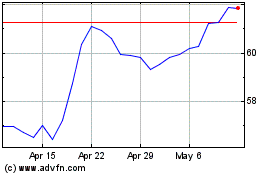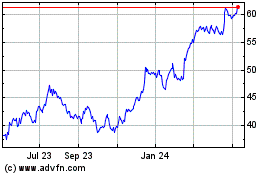Wells Fargo Employees Altered Information on Business Customers' Documents -- Update
May 17 2018 - 10:06AM
Dow Jones News
By Emily Glazer
Some employees in a Wells Fargo & Co. unit that handles
business banking improperly altered information on documents
related to corporate customers, according to people familiar with
the matter.
The behavior again raises questions about Wells Fargo's
risk-management practices and controls. The bank has been
sanctioned in recent months by federal regulators for problems in
these areas and as a result can't grow its balance sheet.
The employees in Wells Fargo's so-called wholesale unit, which
is separate from its retail bank, added or altered information
without customers' knowledge, according to the people familiar with
the matter. The information added varied from social security
numbers to addresses to dates of birth for people associated with
business-banking clients, the people said.
The behavior took place in 2017 and early 2018 as Wells Fargo
was trying to meet a deadline to comply with a regulatory consent
order related to the bank's anti-money-laundering controls, the
people said. The employees were also working to get documents in
order prior to new requirements from another regulator for
disclosures related to proof of beneficial ownership of businesses,
the people added.
Wells Fargo became aware of the behavior in recent months from
employees, the people said. After investigating, the bank
discovered the behavior wasn't an isolated incident, the people
added. The bank is still investigating the matter, one of these
people said.
Wells Fargo has reported the problem to the Office of the
Comptroller of the Currency, one of its main federal regulators,
the people said. That agency is probing the problem, according to a
person familiar with the matter.
A Wells Fargo spokesman said the bank doesn't comment on
regulatory matters. He said in a statement: "This matter involves
documents used for internal purposes. No customers were negatively
impacted, no data left the company, and no products or services
were sold as a result."
The spokesman added: "Over the past several months we've built
more robust internal processes that reinforce our values, and if we
find any situations where behavior violates those values, we take
swift action to correct."
The altering of information within the business-banking division
of Wells Fargo, which serves small firms with annual sales ranging
from $5 million to $20 million, comes as the bank is continuing to
grapple with the fallout from the sales-practices scandal that
erupted in September 2016. That involved bank employees fabricating
information to open as many as 3.5 million accounts without
customers' knowledge or authorization.
Regulators have subsequently sanctioned the bank as more
problems have emerged. Wells Fargo agreed to a $1 billion
settlement with two of its main regulators in April, which forced
the bank to adjust reported first-quarter earnings by $800 million.
The settlement focused on risk-management failures that led to
improper charges to mortgage and auto-lending customers.
Separately, in February, the Federal Reserve slapped the bank
with an unprecedented sanction -- capping its ability to grow --
due to what it said were inadequate risk controls.
The bank had initially indicated that reviews related to the
growth cap would be completed by Sept. 30, followed by final
signoff from the Fed. But Chief Executive Timothy Sloan said at the
bank's recent investor day that the sanction would remain in place
until the first part of 2019.
Earlier in May, Wells Fargo named JPMorgan Chase & Co.
risk-management executive Amanda Norton as its new chief risk
officer, beginning this summer. Wells Fargo is rolling out a new
risk-management framework designed by a consultant after regulators
informally disapproved of previous plans.
Wells Fargo also in May formally asked the OCC for an extension
beyond the initial June 30 deadline of the 2015 consent order
related to its anti-money-laundering controls, some of the people
familiar with the matter said.
At the time of the original 2015 action, Wells Fargo had more
than 100,000 customer accounts it needed to verify with thousands
requiring more specific work, The Wall Street Journal reported in
April. Over the past year or so, the bank has been reaching out to
thousands of clients requesting updated documentation. Wells Fargo
needs those documents to keep those clients.
It was during this work that some employees altered client
information on documents, people familiar with the matter said.
Besides the consent order, the bank's efforts regarding
documentation for business customers had become even more
challenging due to new rules from another regulator -- the Treasury
Department's Financial Crimes Enforcement Network. Those rules,
which kicked in this month, require more stringent disclosure
around the beneficial ownership of legal entities.
Write to Emily Glazer at emily.glazer@wsj.com
(END) Dow Jones Newswires
May 17, 2018 09:51 ET (13:51 GMT)
Copyright (c) 2018 Dow Jones & Company, Inc.
Wells Fargo (NYSE:WFC)
Historical Stock Chart
From Mar 2024 to Apr 2024

Wells Fargo (NYSE:WFC)
Historical Stock Chart
From Apr 2023 to Apr 2024
